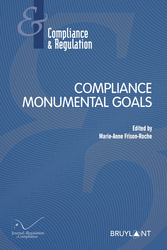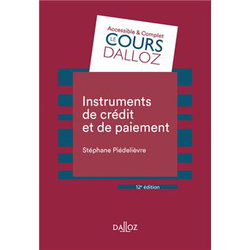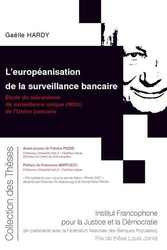Sept. 4, 2025
Thesaurus : Doctrine

► Référence complète : M. Françon, "L’intensité du devoir de vigilance dans le secteur bancaire", in M.-A. Frison-Roche (dir.), L'Obligation de Compliance, Journal of Regulation & Compliance (JoRC) et Dalloz, coll. "Régulations & Compliance", 2025, sous presse.
____
📕lire une présentation générale de l'ouvrage, L'Obligation de Compliance, dans lequel cet article est publié
____
► Résumé de l'article (fait par le Journal of Regulation & Compliance - JoRC) : L'auteur développe le cas des opérateurs bancaire et d'assurance. Il insiste sur le fait qu'en matière bancaire et d'assurance, la vigilance consiste dans une obligation de traiter des informations, au besoin préalablement collectées, en vue de prévenir la survenance d'un risque systémique.
L'identification et la prévention du risque est une obligation de moyens renforcée qui, dans ce cadre, connaît des variations d'intensité. L'obligation est ancienne, alors que le devoir de vigilance est récent. Ce décalage dans le temps s'explique parce que la vigilance obligée est consubstantielle à l'activité même du banquier et de l'assureur et du fait du caractère systémique du secteur depuis toujours, ce qui produit une imbrication du droits dur et souple.
Les variations de l'intensité de l'obligation de vigilance tiennent quant à elles au fait qu'il y a deux types d'obligations : celles qui sont imposées dans l'intérêt de l'activité et du client et celles qui le sont dans l'intérêt de la stabilité du système. Les secondes sont beaucoup plus fortes que les premières. Elles pèsent aussi bien sur le banquier que sur le client. Ainsi les obligations en matière de blanchiment ont pour seul but l'intérêt général, le client ne pouvant se prévaloir des manquements de la banque (Com. 28 avril 2004). D'ailleurs, en matière de gel des avoirs, l'obligation de vigilance devient de résultat.
Dans l'intérêt général lui-même, l'intensité varie en fonction des buts poursuivis, engendrant des vigilances "standard, simplifiée, renforcée", en fonction du risque sous-jacent. En outre, des droits interférents font varier l'obligation, notamment la protection des droits à la protection des données personnelles, ou le droit à la non-immixtion du banquier. Enfin, interfèrent les obligations de vigilance pesant sur les tiers, y compris situés hors de l'Europe.
________
🦉Cet article est accessible en texte intégral pour les personnes inscrites aux enseignements de la Professeure Marie-Anne Frison-Roche
________
________
June 19, 2025
Thesaurus : Autorité de Contrôle Prudentiel et de résolution (A.C.P.R.)
► Référence complète : ACPR, Comm. sanct., déc. n°2024-02, 19 juin 2025, Banque Delubac et Cie
____
_______

March 29, 2025
Publications

🌐follow Marie-Anne Frison-Roche sur LinkedIn
🌐subscribe to the Newsletter MAFR Regulation, Compliance, Law
🌐subscribe to the Video Newsletter MAFR Surplomb
____
 ► Full Reference: M.-A. Frison-Roche, The Contract, a Compliance tool: the Obligation for a platform to control content CE, 27 January 2025, B. c/ CNIL, Working Paper, March 2025.
► Full Reference: M.-A. Frison-Roche, The Contract, a Compliance tool: the Obligation for a platform to control content CE, 27 January 2025, B. c/ CNIL, Working Paper, March 2025.
____
🎤 This Working Paper was developed as a basis for the Overhang👁 video on 29 March 2025 : click HERE (in French)
____
🎬🎬🎬In the collection of the Overhangs👁 It falls into the News category.
►Watch the complete collection of the Overhangs👁 : click HERE
____
► Summary of this Working Paper: The ruling handed down on 15 January 2025 by the Commercial, Economic and Financial Chamber of the French Judicial Supreme Court (Cour de cassation) provides a solution to the issue of content control in the digital environment. It resolves what appears to be the aporia so often emphasised, and even claimed, namely the impossibility of developing an effective controlling technology.
To do this, the Court disregarded the applicable laws and referred to the electronic payment contract between the bank and the platform, which contained a clause on Vigilance against unlawful content, linked to a termination clause. It held that this clause was fully effective. This solution, so simple and so strong, can make a major contribution to regulating the digital space, if the banks so wish, because what platform can do without reliable electronic payment services?
____
🔓read the developments below⤵️
Dec. 7, 2024
Law by Illustrations

► Référence complète : M.-A. Frison-Roche., "Description d'un risque systémique : Description d'un risque systémique : 🎬𝑲𝒆𝒓𝒗𝒊𝒆𝒍 - 𝒖𝒏 𝒕𝒓𝒂𝒅𝒆𝒓 - 𝟓𝟎 𝒎𝒊𝒍𝒍𝒊𝒂𝒓𝒅𝒔", billet décembre 2024.
🎞️voir le film-annonce
___
Dans le documentaire proposé en novembre 2024 par la chaîne Max, le propos est de décrire ce qui est présenté comme l'engrenage déclenché par le comportement solitaire d'un trader, Jérôme Kerviel, sur l'ensemble de la banque Société générale.
On y voit et on y écoute tous les protagonistes s'exprimer en français, doublés en anglais, le quartier de La Défense faisant le fond du décor, pour préserver le marché financier d'une crise systémique.
____
Sept. 19, 2024
Conferences

🌐follow Marie-Anne Frison-Roche on LinkedIn
🌐subscribe to the Newsletter MAFR Regulation, Compliance, Law
____
► Full Reference: M.-A. Frison-Roche, "Comment s’adapter au Contentieux Émergent de la Compliance" ("How to adapt to Emerging Compliance Litigation"), in , Association nationale des juristes de banque (ANJB), September 19, 2024, Paris,
____
This conference is being held with another speaker, Maître Jean-Pierre Picca.
It is followed by a discussion with the audience.
____
🧮see the full programme of this manifestation
____
► English Summary of this conference: Compliance Law is a new branch of Law, teleological in nature, whose legal normativity is rooted in its goals.These are systemic goals of preserving systems by detecting the risks that weaken them and preventing the failures that can destroy them. It is therefore an Ex Ante branch of Law, the implementation of which will weigh on the "entities" in a position to detect risks and prevent failures so that these systemic goals are achieved. As such, they are "Monumental Goals" in that they are political goals aimed at complete systems. It is therefore essential to distinguish between "conformity Law", which simply consists of "complying" with the applicable regulations, and Compliance Law, which consists of contributing to the achievement of these "Monumental Goals", either by force (legal obligation) or by choice (raison d'être, company with mission, contractual obligation, CSR). In this respect, Compliance Law is both much more limited in its aims and much more ambitious, since it is about building the future rather than mechanically complying with regulations.
The banking sector, which can be considered an exception to the principle of Competition, which is based on extreme mobility and the absence of rents, the destruction of the weakest, risk-taking, the lack of solidity of the operator posing no problem, appears to be the paragon of the principle of Compliance, which is based on the sustainability of systems ensured by the solidity of the operators themselves, their solidarity, the exchange of information, and integrated supervisors. For example, the duty of vigilance and the information about others, and the Regulation through Supervision were born in this sector, which has internalised this sectoral concern in the banks, itself the bearer of a general concern, particularly in the European conception of continental banking. the European Banking Union increasing this concern.
As a result, banks will internalise concerns about the future that go beyond safeguarding the banking sector, such as preventing systemic climate risk or educating the population or safeguarding people in vulnerable situations.
____
The litigation that shall ensue is itself highly specific. The topic of this conference is to provide the keys to understanding how banks must play their part.
Emerging Compliance Litigation is systemic in nature. It is a reflection of the Ex Ante organisation whereby entities are asked to make a contribution to the achievement of Monumental Goals. In a dispute between two opposing parties, an individual or an NGO or a trade union or a municipality or a State and a bank, a conflict arises between what might be called the party claiming to represent the present and future interests of a system, for example the climate system or the social relations system, and the bank which has a legally imposed "compliance obligation" to help protect this system.
The author who described this perfectly was Chaïm Perelman, particularly in his 1978 book, Logique juridique, which describes audience circles.
We need to understand the systemic construction of the judicial instance.
The bank must not let to be confined itself solely to its role as litigant, while the other party, for example an NGO, in its role as guardian of "civil society" or the "climate system" or the "effective equality between human beings", going beyond this first circle between the litigants and brings the system itself into the proceedings.
This is where the adaptation has to take place.
________
This adaptation is procedural, evidentiary and substantive.
The procedural adaptation must take place even before any litigation, since there is a continuum between Ex Ante and Ex Post, with the Judicial System itself being just one accountability method (rendering of accounts) among others. This accountability takes place in relation to a ‘mission’ that is entrusted to the banks in relation to the goals: prevention, detection and the fight against corruption, money laundering, climate change, etc., by building alliances, making good use of information (knowing how to take it, knowing how not to pass it on, knowing how to pass it on).
The procedure, i.e. the way in which something is done, must reflect a substantial element, in that it engenders a ‘sense of responsibility’: the purpose of Compliance Law is to ‘make powers accountable’ and to build on positions of power. The proper procedure is to make ‘good use of one's power’ for the benefit of others. Techniques for ‘taking others into consideration’ are an essential element. Consideration by the person who agrees to exercise power (the power to finance, the power to gather information, the power to organise together, the power to contract).
Evidentiary’ adaptation: indifference of evidentiary obligations and rights to the procedural position of the parties. The firm has a ‘Compliance Obligation’ even if it is the defendant in the proceedings. The object of proof is given to it by the Monumental Goals that the Law or its own will require it to help achieve. Its burden is to show that it is helping to achieve these goals, by acting for the future (for example, by knowing its customers, or by taking into account the interests of its stakeholders, etc.).
______
► Structure of the speech:
I. The current situation: suffering the harmful consequences of reducing Compliance Law to the mechanics of "conformity".
II. The opportunity for banks to adapt by understanding Compliance Law and going beyond the mechanics of conformity: the European puzzle, its apparent complexity, its architectural clarity (CSRD/CS3D/DSA).
III. The opportunity for banks not to allow themselves to be trapped in proceedings that are merely sanctions, transferred from Ex Post to Ex Ante: the emergence of Systemic Compliance Litigations before the Ordinary Law Courts (French Law of 2017 on Vigilance; Paris Court of appeal decisions of 18 June 2024).
IV. What is expected of banks in Systemic Compliance and Vigilance Litigations before the Ordinary Courts, reflecting the dialogue and action required by Compliance Law (article to be published).
V. The opportunity for banks to adapt to the new evidentiary dimension of emerging Compliance and Vigilance Litigation (article to be published).
VI. The opportunity for banks to adapt to the new Ex Ante dimension of Systemic Compliance and Vigilance Litigation, Litigation which deals with the future (article to be published).
____
► A few bibliographical references:
🕴️M.-A. Frison-Roche, 📝Compliance Law, 2016
🕴️M.-A. Frison-Roche, 📝Compliance and conformity: distinguish them in order to articulate them, 2024
🕴️M.-A. Frison-Roche, 📝Duty of Vigilance: the way forward, 2024
🕴️M.-A. Frison-Roche, 📝Systemic Litigation, 2024
________
June 28, 2024
Thesaurus : Doctrine
► Référence complète : E. Netter, "Quand la force de conviction du scoring bancaire provoque sa chute. L'interprétation extensive, par la CJUE, de la prohibition des décisions entièrement automatisées", RTD com., 2024, chron., pp.342-348
____
🦉Cet article est accessible en texte intégral pour les personnes inscrites aux enseignements de la Professeure Marie-Anne Frison-Roche
________
June 19, 2024
Thesaurus : 02. Cour de cassation
May 30, 2024
Thesaurus : Doctrine
► Référence complète : Th. Douville, "De l'approche extensive de la prise de décision exclusivement automatisée (à propos du refus d'un prêt fondé sur une note de solvabilité communiquée par un tiers)", D. 2024, pp. 1000-1004
____
🦉Cet article est accessible en texte intégral pour les personnes inscrites aux enseignements de la Professeure Marie-Anne Frison-Roche
________
March 1, 2024
Thesaurus : Doctrine
► Référence complète : C. Granier, "La direction des banques au prisme de la compliance", in A. Maymont (dir.) dossier "Le banquier face à la compliance", RD bancaire et fin., n° 2, mars-avril 2024, dossier 11
____
► Résumé de l'article (fait par l'auteure) : "Incontestable en matière bancaire, le développement de la compliance affecte la direction des banques. Elle pèse en premier lieu sur les organes dirigeants qui voient leur liberté d’organisation restreinte et leur charge alourdie, puisque celle-ci intègre désormais des préoccupations relevant de la compliance. En second lieu, les personnes physiques qui occupent des fonctions de direction sont également affectées du fait d’un alourdissement de leur responsabilité et de la nécessité de satisfaire à des exigences de nature personnelle.".
____
🦉Cet article est accessible en texte intégral pour les personnes inscrites aux enseignements de la Professeure Marie-Anne Frison-Roche
________
March 1, 2024
Thesaurus : Doctrine
► Référence complète : Th. Bonneau, "La construction d’un modèle de compliance européenne au sein du système bancaire et financier", in A. Maymont (dir.) dossier "Le banquier face à la compliance", RD bancaire et fin., n° 2, mars-avril 2024, dossier 8
____
► Résumé de l'article (fait par l'auteur) : "Le modèle de la compliance européenne au sein du système bancaire et financier comporte trois dimensions. La première est éthique alors que les deux autres sont les dimensions préventive et procédurale.".
____
🦉Cet article est accessible en texte intégral pour les personnes inscrites aux enseignements de la Professeure Marie-Anne Frison-Roche
________
Feb. 24, 2024
Interviews

► Full reference: J. Beyssade, "Compliance et gouvernance (exemple d'un groupe bancaire)" (Compliance and governance (example of a banking group)), interview conducted by M.-A. Frison-Roche on the occasion of a series of interviews on Compliance Law, in Fenêtres ouvertes sur la gestion (Open windows on management), broadcast by J.-Ph. Denis, Xerfi Canal, recorded December 12, 2023, recorded February 24, 2024
____
🌐consult the presentation of Jacques Beyssade's interview on LinkedIn
____
🎥view the full interview on Xerfi Canal
____
► Starting point: In 2022, Jacques Beyssade wrote a contribution on 📝Feminisation of positions of responsibility in the workplace as a goal of Compliance, in 📘Compliance Monumental Goals
🧱read the presentation of this contribution ➡️click HERE
____
► Summary of interview:
Marie-Anne Frison-Roche. Question: Compliance and governance are often linked. Can you explain how, in the strategy of a banking group like BPCE, this link between compliance and governance is articulated?
Jacques Beyssade. Answer. Compliance is not just a matter of obeying the rules, but also, and perhaps even more so, of respecting customers, suppliers, stakeholders and members. For a mutualist structure, customers and member-policyholders are closer, they are the same social body, and so it's a matter of governance.
____
MaFR. Q.: Let's take a concrete example, where Compliance and governance serve a specific purpose: effective equality between men and women, for example. How does this work in your Group?
J.B. R.: This objective is in the genes of BPCE, and in particular of the savings banks. The Copé-Zimmermann law requires it. We go beyond this constraint, at the level of governance. The management board, or executive committee, is egalitarian, and this also works as an example. Compliance takes up the baton, for example, by identifying talent, particularly female talent, and correcting any anomalies.
____
MaFR. Q.: In the future, can we hope that this alliance between new governance and the power of Compliance, with the same Monumental Goals, will transform our societies?
J.B. R.: Changes in society come from the behavior of individuals and companies, as demonstrated by the opening of savings accounts to women in the 19th century. Both can do a great deal, within the framework of regulations, by going beyond them. Through governance, for example in a mutual bank like BPCE, it's the members who set the rules, reflecting social movements because they themselves are representative of society as a whole. In this way, through the alliance of governance and compliance, they can act to give concrete expression to the fundamental social movements they themselves represent, through the broad representation of the social body that the member-policyholders constitute.
________
Feb. 15, 2024
Thesaurus : Doctrine

► Full Reference: A. Bruneau, "The company judges itself: the Compliance function in the bank", in M.A. Frison-Roche, (ed.), Compliance Jurisdictionalisation, Journal of Regulation & Compliance (JoRC) and Bruylant, coll. "Compliance & Regulation", 2024, pp. 127-145
____
📘read a general presentation of the book, Compliance Jurisdictionalisation, in which this article is published
____
► Summary of the article: First, it should be remembered that the compliance function was born within finance, and that by being structured, it has evolved to support the transition from regulatory law to compliance law. Through these changes, compliance has gone from an ex-post controlling function to an ex-ante binding function. The LIBOR crisis imperfectly illustrates the primacy of this transition. The evolution of this role is illustrated by concrete examples. Firstly, the management of reputational risk is a fundamental part of the company as prosecutor and judge of itself. Reputational risk is a significant element for a financial institution, because it can have negative consequences on its capitalization, or even culminate in a systemic crisis. Avoiding a large-scale financial crisis is also part of the monumental goals of compliance.
In order to avoid complex and inopportune scenarios, compliance law intervenes as early as possible and identifies issues that may impact reputation. The regulations require the implementation of certain ex ante mechanisms. The French law known as "Sapin 2" requires the implementation of tools that concern all companies (and not just banks). Indeed, beyond the risk of reputation, it is essential to consider the risk of corruption. Consideration of reputational risk may justify refusing to execute certain transactions. From this perspective, compliance must assess the potential consequences of entering into a relationship with a new client upstream, sometimes to decline the provision of services. The compliance function therefore unilaterally judges the relationship with a view to managing the company reputational risk.
Secondly, the internal sanction mechanism established by compliance law is also discussed in this article, in particular the internal sanctions adopted by compliance in a financial institution.
Compliance can act as a prosecutor via management committees set up within the business lines. In addition, compliance can determine and apply sanctions against employees. In this way, there is a dual role of prosecutor and judge for the compliance function within the framework of an extraordinary mechanism of ordinary law.
Finally, the analysis deals with the case of the "judge-judged": following a decision by the bank, the regulator may take an even stricter position by believing that the bank is applying its guidelines incorrectly. Thus, the compliance law, which takes hold within the banking enterprise, finds itself under the judgment of its own regulator. The company finds itself judged and comes to be a prosecutor and judge of itself, but also of its clients.
____
🦉This article is available in full text to those registered for Professor Marie-Anne Frison-Roche's courses
________
Dec. 12, 2023
Thesaurus : Doctrine
► Référence complète : L. Pailler, "Haro de la Cour de justice sur les services d'aide à la décision !", Dalloz actualité, 12 décembre 2023
____
► Résumé de l'article (fait par l'auteur) : "L'établissement automatisé, par une société fournissant des informations commerciales, d'une valeur de probabilité fondée sur des données à caractère personnel relatives à une personne et concernant la capacité de celle-ci à honorer des engagements de paiement à l'avenir constitue une « décision individuelle automatisée », au sens de l'article 22, § 1er, du règlement général sur la protection des données (RGPD), lorsque dépend de manière déterminante de cette valeur de probabilité le fait qu'une tierce partie, à laquelle ladite valeur de probabilité est communiquée, établisse, exécute ou mette fin à une relation contractuelle avec cette personne.".
____
🦉Cet article est accessible en texte intégral pour les personnes inscrites aux enseignements de la Professeure Marie-Anne Frison-Roche
________
Dec. 7, 2023
Thesaurus : 05. CJCE - CJUE
► Référence complète : CJUE, Première chambre, 7 décembre 2023, aff. C‑2023/957, Schuffa.
____
________
Dec. 7, 2023
Thesaurus : 05. CJCE - CJUE
► Full Reference: ECJ, First chamber, 7 December 2023, case C‑634/21, Schufa Holding AG
____
____
________
March 15, 2023
Thesaurus : Doctrine

► Full Reference: A. Le Goff, "Monumental Goals Perceived by the Firm: Serene Business or Business under Pressure?", in M.-A. Frison-Roche (ed.), Compliance Monumental Goals, coll. "Compliance & Regulation", Journal of Regulation & Compliance (JoRC) and Bruylant, 2023, p. 83-90.
____
📘read a general presentation of the book, Compliance Monumental Goals, in which this article is published.
____
► Summary of the article:
________
Feb. 2, 2023
Thesaurus : Doctrine

► Full Reference: A. Bruneau, "L'entreprise juge d'elle-même : la fonction compliance dans la banque" ("The company judge of itself: the compliance function inside the bank"), in M.-A. Frison-Roche (ed.), La juridictionnalisation de la Compliance, coll. "Régulations & Compliance", Journal of Regulation & Compliance (JoRC) and Dalloz, 2023, p. 115-131.
____
📕read a general presentation of the book, La juridictionnalisation de la Compliance, in which this article is published
____
► Summary of the article (done by the author): First of all, it should be remembered that the compliance function was born within finance, and that by being structured, it has evolved to support the transition from regulatory law to compliance law. Through these changes, compliance has gone from an ex-post controlling function to an ex-ante binding function. The LIBOR crisis imperfectly illustrates the primacy of this transition. The evolution of this role is illustrated by concrete examples
Firstly, the management of reputational risk is a fundamental part of the company as prosecutor and judge of itself. Reputational risk is a significant element for a financial institution, because it can have negative consequences on its capitalization, or even culminate in a systemic crisis. Avoiding a large-scale financial crisis is also part of the monumental goals of compliance.
In order to avoid complex and inopportune scenarios, compliance law intervenes as early as possible and identifies issues that may impact reputation. The regulations require the implementation of certain ex ante mechanisms. The French law known as "Sapin 2" requires the implementation of tools that concern all companies (and not just banks). Indeed, beyond the risk of reputation, it is essential to consider the risk of corruption. Consideration of reputational risk may justify refusing to execute certain transactions. From this perspective, compliance must assess the potential consequences of entering into a relationship with a new client upstream, sometimes to decline the provision of services. The compliance function therefore unilaterally judges the relationship with a view to managing the company reputational risk.
Secondly, the internal sanction mechanism established by compliance law is also discussed in this article, in particular the internal sanctions adopted by compliance in a financial institution.
Compliance can act as a prosecutor via management committees set up within the business lines. In addition, compliance can determine and apply sanctions against employees. In this way, there is a dual role of prosecutor and judge for the compliance function within the framework of an extraordinary mechanism of ordinary law.
Finally, the analysis deals with the case of the "judge-judged": following a decision by the bank, the regulator may take an even stricter position by believing that the bank is applying its guidelines incorrectly. Thus, the compliance law, which takes hold within the banking enterprise, finds itself under the judgment of its own regulator. The company finds itself judged and comes to be a prosecutor and judge of itself, but also of its clients.
__________
Sept. 1, 2022
Thesaurus : Doctrine

► Full Reference: C. Peicuti et J. Beyssade, "La féminisation des postes à responsabilité dans les entreprises comme but de la compliance. Exemple du secteur bancaire" ("The feminization of responsibility positions in companies as a Compliance Goal. Example of the banking sector"), in M.-A. Frison-Roche (ed.), Les Buts Monumentaux de la Compliance, coll. "Régulations & Compliance", Journal of Regulation & Compliance (JoRC) and Dalloz, 2022, 109-124.
____
📕read a general presentation of the book, Les Buts Monumentaux de la Compliance, in which this article is published
____
► Summary of the article (done by the Journal of Regulation & Compliance): If the Compliance techniques are conceived as taking their meaning by their Goal, the latter being in particular the protection and the effective promotion of human beings, to be reinforced in the future thanks to Compliance Law tools, the example of the effective promotion of efficient equality between women and men in the banking sector to exercise responsible functions is clear.
strongly feminized, the image of banking sector remains masculine and in fact too few women exercise positions of responsibility, although no text is opposed to it and all rights have been allocated for this. To move from this situation to a future where equality will be effective, it is therefore in terms of regulatory mechanisms that we should think of the necessary transformation and even more of "transition" so that one day a de facto equality will be established. and appears natural to all.
The bank must then structurally integrate this Goal, which corresponds to the definition of Compliance. To do this, the banking company is part of a long-term voluntary Compliance process, relying in particular on human resources and on the public authorities of the European Banking Union which, by further implementing the concept of sustainable economy, facilitated this long-term action. In this transition, each action and result must be considered in relation to this sought-after goal of effective equality: each progress must be valued not so much in relation to the past but in relation to the future. This Ex Ante perspective justifies these self-binding Compliance techniques, such as plans, commitments, quotas, stakeholder implications, and more flexible techniques such as examples given by managers, internal training and joint affirmations with the public authorities, are all used by the company to achieve this Monumental Goal of effective equality between human beings.
The banking sector is all the more exemplary for this because the banking authorities themselves deploy incentives in this direction, the definition of Compliance Law as an alliance between the Authorities and the Companies therefore corresponding to such an action clearly in progress, structurally in the BPCE group.
________
Sept. 1, 2022
Thesaurus : Doctrine

► Full Reference: A. Le Goff, "La part des banques dans la concrétisation des buts monumentaux de la compliance" ("The banks' part in achieving the Compliance Monumental Goals"), in M.-A. Frison-Roche (ed.), Les Buts Monumentaux de la Compliance, coll. "Régulations & Compliance", Journal of Regulation & Compliance (JoRC) and Dalloz, 2022, p. 69-75.
____
📕read a general presentation of the book, Les Buts Monumentaux de la Compliance, in which this article is published
____
► Summary of the article (done by the Journal of Regulation & Compliance): As the head of a banking group, the question is whether compliance requirements and techniques put companies "under pressure" or whether these obligations represent an opportunity for them, the former not excluding the latter. The author shows that the entire banking sector is under pressure from regulations that express the aim of Monumental Goals, the complexity coming from the fact that these evolve over time, sometimes making it difficult to comply with them. Within this general framework, the author shows that a mutual bank such as Crédit Mutuel Arkéa has great opportunities, since these Monumental Goals resonate not only with its social responsibility, particularly in a context of crisis, but also with what is, for Arkéa, its "raison d'être". Regulation thus supports the Group's operations and it's identity.
________
Aug. 31, 2022
Editorial responsibilities : Direction of the collection "Cours-Série Droit privé", Editions Dalloz (33)

►Référence complète : Piédelièvre, S., Instruments de crédit et de paiement, 12ième éd., Dalloz, Coll. "Cours Dalloz-Série Droit privé", 2022, 453 p.
____
►Présentation de l'ouvrage : l'ouvrage expose tout d'abord la théorie des comptes. Puis les instruments de crédit, que sont les effets de commerce et les nouveaux instruments de crédit. Dans la seconde partie de l'ouvrage, les instruments de paiement sont expliqués, à savoir le chèque et les nouveaux moyens de paiement.
Ce manuel permet ainsi de comprendre les instruments juridiques par lesquels les entreprises se procurent du crédit et paient les créances que les tiers ont sur elles : la lettre de change ou le billet à ordre ou le chèque, l'ensemble fonctionnant le plus souvent à travers un compte bancaire.
Dans cette tradition qui demeure ancrée dans le droit civil dont les principes directeurs continuent de régir la matière, la modernité de certains instruments renouvelle celles-ci, comme la cession Dailly ou encore la monnaie électronique qui bouleverse le droit du paiement.
Ce manuel clair et avant tout pédagogique explique cette dialectique du droit classique et de la modernité des techniques.
____
📚Consulter l'ensemble de la collection dans laquelle l'ouvrage a été publié.
Feb. 9, 2022
Teachings : Droit de la régulation bancaire et financière - semestre 2022

 ► Référence complète : Frison-Roche, M.-A., Prévention et sanction des Abus de Marchés, in Leçons de Droit de la Régulation bancaire et financière, Sciences po (Paris), 9 février 2022.
► Référence complète : Frison-Roche, M.-A., Prévention et sanction des Abus de Marchés, in Leçons de Droit de la Régulation bancaire et financière, Sciences po (Paris), 9 février 2022.
____
► Résumé de la leçon sur les Abus de marché : Dans une conception classique et du Droit et du "libre marché", le principe est la liberté d'action de la personne. Même si l'exercice de cette liberté, voire d'un droit subjectif peut causer un dommage, par exemple un dommage concurrentiel, c'est en quelque sorte le prix légitime d'une société libre et concurrentielle. Ainsi dans une conception libérale, seul l'abus est sanctionné, c'est-à-dire l'exercice fautif que l'on fait de sa liberté ou de son droit, allant parfois jusqu'à l'exigence d'une faute qualifiée.
Mais les secteurs bancaires et financiers ne sont pas gouvernés par le principe de libre concurrence. Ils sont gouvernés par le principe de régulation, le principe de concurrence n'y a qu'un rôle adjacent. Cela ne pourra qu'engendrer de graves difficultés lorsque le Droit de la concurrence et le Droit bancaire et financier font s'appliquer d'une façon cumulée ou confrontée sur une même situation.
Les marchés financiers sont construits sur le principe de régulation qui pose le principe de transparence et de partage d'une information exacte : c'est ainsi que l'intégrité des marchés financiers est assurée, l'Autorité des Marchés financiers en étant le gardien.
La prévention et la sanction des "abus" de marché est donc non pas une part résiduelle du Droit financier, mais un pilier de celui-ci, contrairement au Droit des marchés ordinaires concurrentiels, sur lesquels l'opacité et le non-partage des informations est la règle.
Cela explique l'état du droit des "abus de marché", dont l'effectivité de la prohibition est essentielle pour le bon fonctionnement ordinaire des marchés financiers. Leur prohibition nationale a été harmonisée par le Droit de l'Union européenne, à travers des textes dont les signes reprennent l'appellation anglaise : Market abuses (ainsi le nouveau Règlement communautaire sur les abus de marché est dit Règlement MAR (Market Abuses Regulation) et la directive qui l'accompagne MAD (Market Abuses Directive).
Il sanctionne un certain nombre de comportements, qui portent atteinte à l'intégrité des marchés,
Mais il n'exprime plus des exceptions par rapport à un principe : des fautes par rapport à des libertés ou à des droits. Il exprime des moyens par rapport à des principes dont la sanction des abus ne constitue que la concrétisation de principes dont ils sont la continuité même : l'efficacité du marché, son intégrité, sa transparence, l'information de l'investisseur.
C'est pourquoi la sanction des abus de marché ne sont pas du tout un phénomène périphérique par rapport à la Régulation des marchés financiers et à l'activité et au fonctionnement des bancaires, comme l'est le Droit pénal : elle est au contraire à la fois ordinaire et centrale. Cette différence des deux ordres publics va se retrouver dans la question lancinante de la sanction pénale et de la sanction administrative des mêmes abus de marché (par exemple "manquement d'initié" et "délit d'initié", qui ont tendance à se cumuler dans des techniques de répression qui seront l'objet de la prochaine leçon.
_____
🔎 Accéder aux slides servant de support à la leçon sur les abus de marché
🔎 Revenir aux bases avec le Dictionnaire bilingue du Droit de la Régulation et de la Compliance
🔎 Approfondir par la Bibliographie générale de Droit de la Régulation bancaire et financière
🔎 Revenir à la présentation générale du cours
🔎 Se reporter au plan général du cours
____
Utiliser les matériaux ci-dessous pour aller plus loin et pour préparer votre conférence de méthode ⤵️
Dec. 21, 2021
Thesaurus : Doctrine

► Référence complète : G. Hardy, L'européanisation de la surveillance bancaire. Étude du mécanisme de surveillance unique (MSU) de l'Union bancaire, préf. Fr. Martucci, avant-propos F. Picod, Institut Francophone pour la Justice et la Démocratie (IFJD), en partenariat avec la Fédération Nationale des Banques Populaires, coll. "Thèses", 2021, 888 p.
____
____
📗lire le sommaire de l'ouvrage
____
📗lire la table des matières de l'ouvrage
____
► Résumé de l'ouvrage (fait par l'éditeur) : "Sur le fondement de l'article 127, paragraphe 6, du traité sur le fonctionnement de l'Union européenne (TFUE), le Conseil de l'Union européenne a établi, le 4 novembre 2014, un nouveau système de supervision bancaire dans l'Union européenne : le mécanisme de surveillance unique (MSU). Ce dernier est formé de la Banque centrale européenne (BCE) et des autorités nationales de surveillance bancaire de la zone euro. Loin de se limiter à la lettre, à première vue restrictive, du TFUE, le législateur de l'Union a confié à la BCE des pouvoirs afin de contrôler, directement ou indirectement, en coopérant étroitement avec les superviseurs nationaux, l'ensemble des banques situées dans la zone euro et dans les autres États membres qui participent au MSU. En partant de deux impératifs de prime abord contradictoires - le besoin d'élever la surveillance bancaire au niveau de l'Union et la nécessité de maintenir un rôle important pour les autorités nationales -, l'Union s'est dotée d'un système de surveillance bancaire, unique, hybride et interdépendant, dans lequel les autorités européennes et nationales interagissent pour mettre en oeuvre tant le droit de l'Union que le droit national. Sans réduire le MSU à un modèle théorique préconçu, l'analyse de ses fondements juridiques et de son fonctionnement général met en exergue des spécificités qui témoignent de l'émergence d'une nouvelle méthode d'intégration : l'européanisation.".
________
Nov. 8, 2021
Thesaurus : Doctrine

► Full Reference: Peicuti, C. et Beyssade, J., Feminisation of positions of responsibility in the workplace as a goal of Compliance, in Frison-Roche, M.-A. (ed.), Compliance Monumental Goals, series "Compliance & Regulation", Journal of Regulation & Compliance (JoRC) and Bruylant, to be published.
____
► Article Summary: If the Compliance techniques are conceived as taking their meaning by their Goal, the latter being in particular the protection and the effective promotion of human beings, to be reinforced in the future thanks to Compliance Law tools, the example of the effective promotion of efficient equality between women and men in the banking sector to exercise responsible functions is clear.
strongly feminized, the image of banking sector remains masculine and in fact too few women exercise positions of responsibility, although no text is opposed to it and all rights have been allocated for this. To move from this situation to a future where equality will be effective, it is therefore in terms of regulatory mechanisms that we should think of the necessary transformation and even more of "transition" so that one day a de facto equality will be established. and appears natural to all.
The bank must then structurally integrate this Goal, which corresponds to the definition of Compliance. To do this, the banking company is part of a long-term voluntary Compliance process, relying in particular on human resources and on the public authorities of the European Banking Union which, by further implementing the concept of sustainable economy, facilitated this long-term action. In this transition, each action and result must be considered in relation to this sought-after goal of effective equality: each progress must be valued not so much in relation to the past but in relation to the future. This Ex Ante perspective justifies these self-binding Compliance techniques, such as plans, commitments, quotas, stakeholder implications, and more flexible techniques such as examples given by managers, internal training and joint affirmations with the public authorities, are all used by the company to achieve this Monumental Goal of effective equality between human beings.
The banking sector is all the more exemplary for this because the banking authorities themselves deploy incentives in this direction, the definition of Compliance Law as an alliance between the Authorities and the Companies therefore corresponding to such an action clearly in progress, structurally in the BPCE group.
____
📝 see the general presentation of the book 📘Compliance Monumental Goals in which this article is published
________
Sept. 30, 2021
Thesaurus : Soft Law
► Référence complète : Parlement européen, Preventing money laundering in the banking sector reinforcing the supervisory and regulatory framework, 30 septembre 2021.
___
________
Feb. 24, 2021
Thesaurus : Jurisprudence
Full reference: Autorité de Contrôle Prudentiel et de Résolution (French Banking Regulator), Commission des sanctions (Commission of sanctions), 24th of February 2021, ING Bank France, procedure n°2020-02
Read the decision (in French)
In this decision, the ACPR Sanctions Commission condemns IGN Bank France to a reprimand and a financial penalty of 3 million euros because of the inadequacy of its measures to fight corruption, money laundering and financing of terrorism.
Extract from the decision summarizing ING France's breaches of its Compliance obligations to fight against corruption, money laundering and financing of terrorism:
"At the time of the on-site check, ING France's risk classification was incomplete and ineffective (grievance 1) and its system for monitoring its business relations (complaint 2) and their operations (grievance 4) presented serious deficiencies, as well as its organization and procedures for fund transfers (grievance 3). The updating of customer knowledge was insufficient (grievance 5), as were the detection of PEPs and the implementation of measures due diligence for this category of clientele (grievance 6). For the implementation of its due diligence obligations, numerous shortcomings were noted, whether these were breaches of the obligation to carry out a reinforced examination (grievance 7) or breaches of the obligation to send Tracfin a DS, initial (grievance 8) or additional (grievance 9). Finally, the detection of persons subject to an asset freezing measure was not fully effective (grievance 10) " (our translation of the decision which is only available in French).